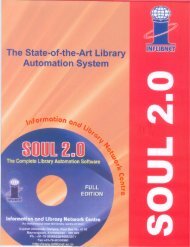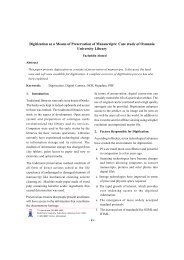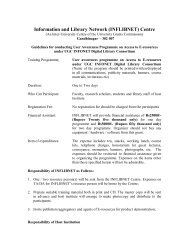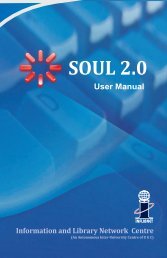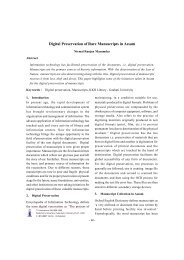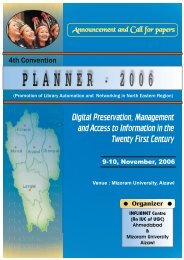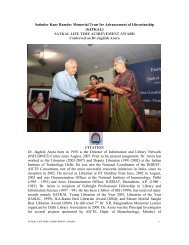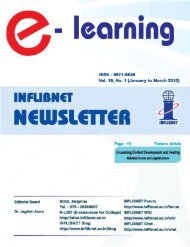Panjab University - INFLIBNET Centre
Panjab University - INFLIBNET Centre
Panjab University - INFLIBNET Centre
You also want an ePaper? Increase the reach of your titles
YUMPU automatically turns print PDFs into web optimized ePapers that Google loves.
44 M.A. POLITICAL SCIENCE (SEMESTER SYSTEM) SYLLABUS4. Dipankar Gupta, The Context of Ethnicity : Sikh Identity in a Comparative Perspective (New Delhi,Oxford <strong>University</strong> Press, 1996).5. Ashutosh Varshney, Ethnic Conflict and Civic Life : Hindus and Muslims in India (New Delhi,Oxford <strong>University</strong> Press, 2005).6. Gurpreet Mahajan, Identities and Rights : Aspects of Liberal Democracy in India (New Delhi,Oxford <strong>University</strong> Press, 2001).7. Tapan K. Bose and Rita Manchanda (eds.), States, Citizens and Outsiders : The Uprooted Peoplesof South Asia (Kathmandu, South Asian Forum for Human Rights, 1997).8. Ranabir Samaddar, The Marginal Nation : Transborder Migration from Bangladesh to West Bengal(New Delhi, Sage Publications, 1999).9. Sanjeev Baruah, Durable Disorder : Understanding the Politics of Northeast India (New Delhi,Oxford <strong>University</strong> Press, 2005).10. Urmila Phadnis, Ethnicity in South Asia (New Delhi, South Asian Publishers, 1986).11. Urmila Phadnis, Kalim Bahadur, S.D. Muni (eds.), Domestic Conflicts in South Asia : PoliticalDimensions, Vol. I (New Delhi, South Asian Publishers, 1986).12. _____________________, Domestic Conflicts in South Asia : Economic and Ethnic Dimensions,Vol. II (New Delhi, South Asian Publishers, 1986).13. Veena Kukreja, Civil-Military Relations in South Asia (New Delhi, Sage Publications, 1991).14. Ponna Wignaraja and Akmal Hussain, The Challenge in South Asia : Development, Democracy andRegional Cooperation (New Delhi, Sage Publications, 1989).15. Paul R. Brass, Ethnicity and Nationalism : Theory and Comparison (New Delhi, Sage Publications,1991).Option (c) : WOMEN AND POLITICS IN INDIAINSTRUCTIONS FOR THE PAPER-SETTERS AND CANDIDATES :(i)(ii)The theory question paper will be of 80 marks and 20 marks will be for internal assessment.For private candidates, who have not been assessed earlier for internal assessment, the marks securedby them in theory paper will proportionately be increased to maximum marks of the paper in lieu ofinternal assessment.The paper setter must put note (ii) in the question paper.The syllabus has been divided into four units.There shall be 9 questions in all. The first question is compulsory and shall be short answer typecontaining 15 short questions spread over the whole syllabus to be answered in about 25 to 30 words each.The candidates are required to attempt any 10 short answer type questions carrying 20 marks i.e. 2 marksfor each. Rest of the paper shall contain 4 units. Each unit shall have two questions, and the candidatesshall be given internal choice of attempting one question from each Unit – 4 in all. Each question will carry15 marks.Objectives : The paper aims to introduce students to the key contemporary debates concerning women andpolitics in India. It will include an analysis of the Indian state, the role of women’s movement and themajor feminist issues in contemporary Indian politics.


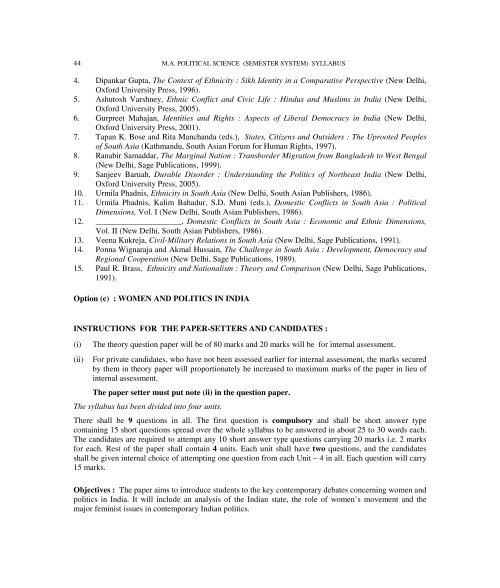
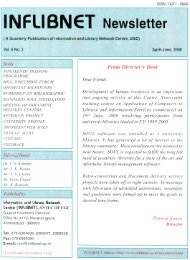

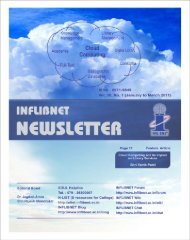
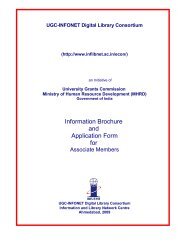
![Uni of Delhi_MA_History[1]. - INFLIBNET Centre](https://img.yumpu.com/48586372/1/190x245/uni-of-delhi-ma-history1-inflibnet-centre.jpg?quality=85)
